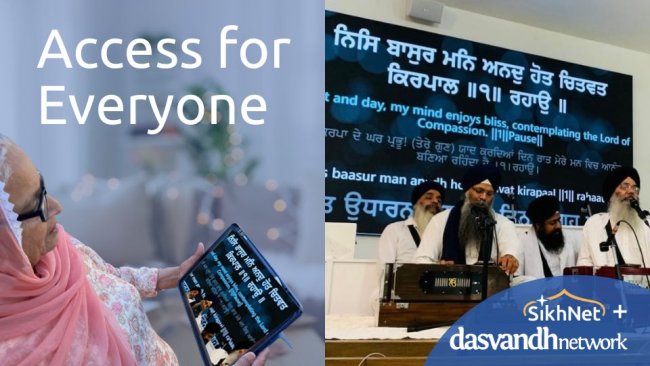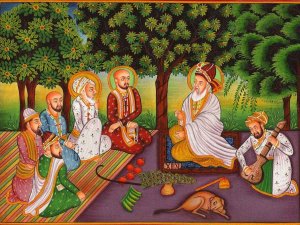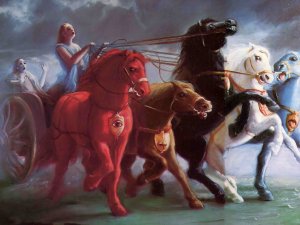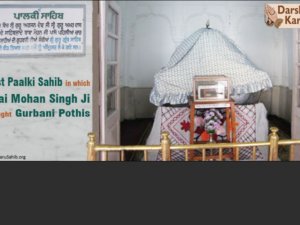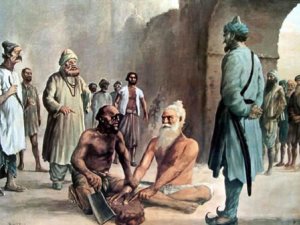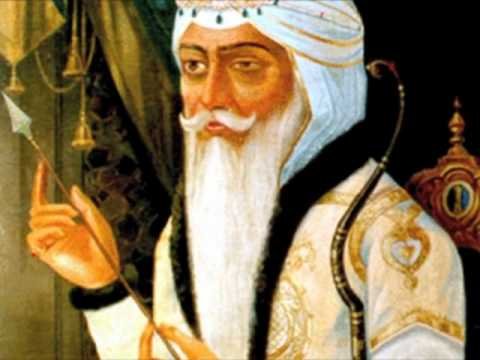 Most of us know Maharaja Ranjit Singh as a secular administrator, brave conqueror, and consolidator of the conquered areas who created a strong state of five rivers which extended from Sutlej River to Afghanistan and Kashmir where people lived peacefully. He is respected as a brave general who checked the foreign invaders who looted our land and abducted our ladies to auction them in the foreign lands. On the basis of my study of many books and articles about the Maharaja, I have found that he was also a patron of literature and I would share this with my readers.
Most of us know Maharaja Ranjit Singh as a secular administrator, brave conqueror, and consolidator of the conquered areas who created a strong state of five rivers which extended from Sutlej River to Afghanistan and Kashmir where people lived peacefully. He is respected as a brave general who checked the foreign invaders who looted our land and abducted our ladies to auction them in the foreign lands. On the basis of my study of many books and articles about the Maharaja, I have found that he was also a patron of literature and I would share this with my readers.
Love for Literature
In spite of the adverse circumstances of his time most of which was spent in fighting against the foreign invaders, extending and consolidating his empire, he never lost his love for literature. No doubt, he was illiterate, but he had instructed his Generals that the Khalsa army should not destroy any library in the area they conquer. In 1834 when Hari Singh Nalwa and Prince Nau Nihal Singh attacked Peshawar, he instructed them to see that no damage was done to the precious library at Peshawar. It is said that his own library had hundreds of Arabic, Persian, Hindi and Punjabi books.
Patronizing Writers of Foreign Languages
Maharaja Ranjit Singh was well known for his patronage of literary persons. He was conscious of his duty towards them. He liberally patronized Giani Sant Singh, a scholar of Sanskrit, Punjabi and Persian, who translated The Ramayana by Tulsi Daas.
Fakir Aziz-ud-din and Qadar Bakhsh, his well-known courtiers, were famous scholars of Persian and Arabic As recorded by Sita Ram Kohli, the later was sent by the Maharaja to Ludhiana to learn English at the state expenses.
Zafarnamah Ranjit Singh written in 1832-33 by Dewan Amar Nath is a contemporary Persian source of the reign of the Maharaja who asked him to write. It consists of 41 chapters and was edited by Sita Ram Kohli in 1928. In 1834, he also wrote Fatehnamah in order to celebrate the victory of the Lahore Darbar forces when they conquered and annexed Peshawar.
Another famous scholar, Ahmad Yar, wrote Shahnama Ranit Singh. Munshi Sohan Lal Suri wrote a unique history book, Umdatul Twarikh. Pandit Radha Krishan, author of Qwaide Rajparbandh ( Rules of Administration), was a favorite scholar of Ranjit Singh. Himat Singh was commissioned by the Maharaja to write a book about the administration of Kashmir.
Poets of the Punjabi Language & Ranjit Singh
Ranjit Singh bestowed landed property on many Punjabi poets and awarded them with a lot of cash. Syed Hashim Shah (1734-1843), author of the love story of Shirin Ferhad, was his favorite poet. Manuscript of this book duly stamped by the seal of the Maharaja can be seen in the state archives at Patiala. He was granted Jagir (land) near his village, Jagdeoe, in recognition of his literary eminence. His stories of 'Sassi Punnu' and of 'Sohni Mehiwal', in Punjabi are well known.
Bhai Budh Singh Lahori wrote in poetry a huge book 'Budh Baridh' as desired by the Maharaja, He mentioned this fact in 60th stanza of the book. It is translation of a famous Persian book, Auardanish, about politics.
Bhai Sondha Singh, a poet and scholar of saintly nature was another jewel of his court. In 1808, he translated a Persian book 'Hatamnama'. It is his best composition.
Kadar Yar, a famous narrative poet of his time, writes that he was awarded landed property with a well by the Maharaja for writing the story of Puran Bhagat.
Hakam Singh of Raipur wrote more than a dozen compositions. His poem 'Siharfi Guru Khalse Shah Kee' is very famous.
Zafar Beg and Sawan Yar were some other poets who were also patronized by Ranjit Singh. In one of his compositions, Zafar Beg writes that Ranjit Singh was cheated and poisoned by the Firangis.
Shah Mohammad has immortalized himself by writing 'Jangnama'. He writes that main cause of the defeat of the Khalsa army was the absence of the Maharaja (Shah Mohammada ik sarkar bajhon fojan jit ke ant noon harian nee.). He admires Ranjit Singh by writing that his empire was truly secular.
Bhag Singh and Kahan Singh Banga were two other well-known poets of the court. Efforts made by the Maharaja for the Punjabi literature are praiseworthy. Piara Singh Padam, a reputed Punjabi writer, in one of his articles, Maharaja Ranjit Singh and Punjabi, has given a long list of 24 Punjabi writers and poets who were liberally patronized by the Maharaja.
Sankrit and Hindi Writers Patronized by Ranjit Singh
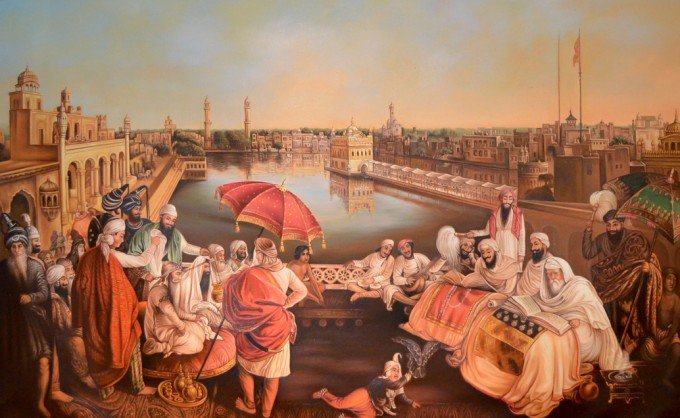
Maharaja Ranjit Singh at the Darbar Sahib hearing a recitation of the Guru Granth Sahib
The Maharaja did not patronize only the writers of Persian and Punjabi, but he was also liberal towards poets and writers of Sanskrit and Hindi whom he awarded profusely in spite of the fact that some of them did not belong to Punjab. Pandit Nihal Singh Lahori who interpreted 'Japji' in Sanskrit was a reputed poet in the court of the Maharaja. He also wrote two books-Sikhi Parbhakar and Nirmal Parbhakar. In these books, he praised the Khalsa.
In his book 'Fatehnamah Guru Khalsa Jee Ka', Ganesh Daas Pingal has nicely narrated the wars of Multan and Peshawar fought by Ranjit Singh. Gwal Bhatt of Mathura who narrated in detail victories of Ranjit Singh in his epic 'Vijaie Vinod' lived in the Maharaja's court for a long time. He was a reputed Hindi poet and was paid 500 rupees per month. He wrote that during the reign of the Maharaja the lion and the goat could quench their thirst together from the same ferry.
Bhai Megh Singh, a student of Giani Sant Singh, wrote the biography of his teacher in his book 'Bhai Sahib Chandrak'. Another famous poet of the court, Puran Singh, wrote the most important story of the conquest of Sirhind.
Maharaja Ranjit Singh and his Court Language
No doubt, during the Maharaja's reign the Punjab witnessed about 40 years of peace. Still, the foundation of the Sikh power rested upon military organization, therefore, the main emphasis was on military matters. Persian had been the court language since long. No doubt the ruler was new, but the courtiers and system did not change.
Moreover, Ranjit Singh was awfully busy in extending and consolidating his empire. Strengthening the state borders and teaching a lesson to the foreign invaders from the west who insulted and looted us took his whole time. Afghans from the west and British soldiers from Delhi were eager to usurp his kingdom.
Court language of the neighboring states and even that of the East India Company was Persian. Even the Marathas in the 18th century had Persian as their court language. The whole office record of the Peshwas period was in Persian. It does not mean that the Maharaja did not want to introduce Punjabi in Gurmukhi script as the official language The fact is that circumstances did not allow him to take this step. Changing required a long and peaceful period. Conversation in the offices was done in Punjabi'
Lover of Calligraphy
As described by Fakir Aziz-ud- din, the Maharaja rewarded calligraphists. Once Pir Bakhash, a calligraphist of Arabic and Persian, wrote the holy Quran and was looking for some rich Muslim who may take the holy Quran and give him a good award. When the Maharaja came to know of it, he sent for Pir Bakhash, took the holy Quran from him for ten thousand rupees. The Fakir asked the Mahraja why he did that as it was something that concerned a Muslim. The Maharaja said, "God granted me only one eye so that I may see all the holy books with one eye."
Conclusion
I agree with Sayed Mohammmad Latif who wrote in his book 'History of the Punjab' that Maharaja Ranjit Singh patronized the scholars and poets of Arabic, Persian, Hindi and Punjabi whose compositions are a valuable source for the history of his period.
